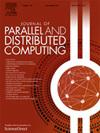Teaching parallel and distributed computing using data-intensive computing modules
IF 3.4
3区 计算机科学
Q1 COMPUTER SCIENCE, THEORY & METHODS
引用次数: 0
Abstract
Parallel and distributed computing (PDC) courses are useful for computer science (CS) and domain science students. For CS students, PDC is a fundamental field that examines concepts relating to a range of CS subfields, such as algorithms, architecture, simulation, software, systems, among others. Students with domain science backgrounds also require PDC to carry out their research objectives, and the ongoing data revolution has exacerbated this necessity. Given the rise of data science and other data-enabled computational fields, we propose several data-intensive pedagogic modules that are used to teach PDC using message-passing programming with the Message Passing Interface (MPI). These modules employ activities that are interesting, relevant, and accessible to both computer and domain science students enrolled in graduate level programs.
Using pre- and post-module completion quizzes and anonymous free response surveys, we evaluated the efficacy of the pedagogic modules across four cohorts of students enrolled in a graduate level High Performance Computing (HPC) course at Northern Arizona University. The students have diverse educational backgrounds as some students were enrolled in programs outside of CS. These programs include electrical and computer engineering, mechanical engineering, astronomy & planetary science, bioinformatics, and ecoinformatics. Despite the multi-disciplinary backgrounds of the students, we find that the hands-on application-driven approach to teaching PDC was successful at helping students learn core PDC concepts, and that the modules are useful for facilitating online learning which was required during the COVID-19 pandemic.
使用数据密集型计算模块教授并行和分布式计算
并行和分布式计算(PDC)课程对计算机科学(CS)和领域科学的学生很有用。对于计算机科学专业的学生来说,PDC是一个基础领域,它研究了与一系列计算机科学子领域相关的概念,如算法、架构、仿真、软件、系统等。具有领域科学背景的学生也需要PDC来完成他们的研究目标,而正在进行的数据革命加剧了这种必要性。鉴于数据科学和其他支持数据的计算领域的兴起,我们提出了几个数据密集型教学模块,用于使用消息传递接口(MPI)的消息传递编程来教授PDC。这些模块采用的活动是有趣的,相关的,并可访问的计算机和领域科学的学生就读研究生水平的课程。采用模块完成前和模块完成后的测验和匿名自由回答调查,我们评估了四组在北亚利桑那大学注册研究生水平高性能计算(HPC)课程的学生的教学模块的有效性。这些学生有着不同的教育背景,一些学生参加了CS以外的课程。这些专业包括电气与计算机工程、机械工程、天文学等。行星科学、生物信息学和生态信息学。尽管学生具有多学科背景,但我们发现,实践应用驱动的PDC教学方法在帮助学生学习PDC核心概念方面取得了成功,并且这些模块有助于促进COVID-19大流行期间所需的在线学习。
本文章由计算机程序翻译,如有差异,请以英文原文为准。
求助全文
约1分钟内获得全文
求助全文
来源期刊

Journal of Parallel and Distributed Computing
工程技术-计算机:理论方法
CiteScore
10.30
自引率
2.60%
发文量
172
审稿时长
12 months
期刊介绍:
This international journal is directed to researchers, engineers, educators, managers, programmers, and users of computers who have particular interests in parallel processing and/or distributed computing.
The Journal of Parallel and Distributed Computing publishes original research papers and timely review articles on the theory, design, evaluation, and use of parallel and/or distributed computing systems. The journal also features special issues on these topics; again covering the full range from the design to the use of our targeted systems.
 求助内容:
求助内容: 应助结果提醒方式:
应助结果提醒方式:


